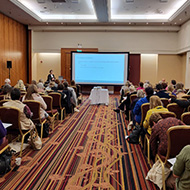
The inaugural event attracted more than 80 scientists, vets, breeders and owners.
Dog health and welfare experts from across the UK recently gathered in Warwickshire for the Kennel Club's inaugural Health and Welfare Conference.
More than 80 scientists, vets, rescue and breed club representatives, breeders and owners convened at Chesford Grange, Kenilworth, on Saturday (12 November) to collaborate on an array of canine health topics.
Kennel Club geneticist Dr Joanna Ilska discussed breeding tools for the future, and cardiologist Dr Hannah Stephenson explained more about heart health in dogs.
Meanwhile, The Kennel Club health team met with Breed Health Coordinators to discuss Breed Health and Conservation Plans, new research, setting up health surveys, small breed populations and genetic diversity, and Breed Watch.
Representatives from The Kennel Club Breed Rescue and the Assured Breeders scheme were also on hand to answer queries and offer advice.
Commenting on the success of the conference, Bill Lambert, health, welfare and breeder services executive at The Kennel Club, said: “We were delighted to welcome all those interested in discussing, protecting and improving dog health and welfare at the conference this weekend.
“Meeting in-person meant there was much discussion among attendees and speakers, and the sessions from our experts were well received and informative. I would like to thank all those who attended the event and continue to do their bit to improve dog health and welfare, and those who organised, presented and contributed to its success.
“We hope to hold another similar event next year at The Kennel Club in London to continue to find ways to collaborate and make a difference for dogs together.”
Image (C) Kennel Club.



 BSAVA is to partner with BVA Live (11-12 June 2026) to champion clinical research.
BSAVA is to partner with BVA Live (11-12 June 2026) to champion clinical research.